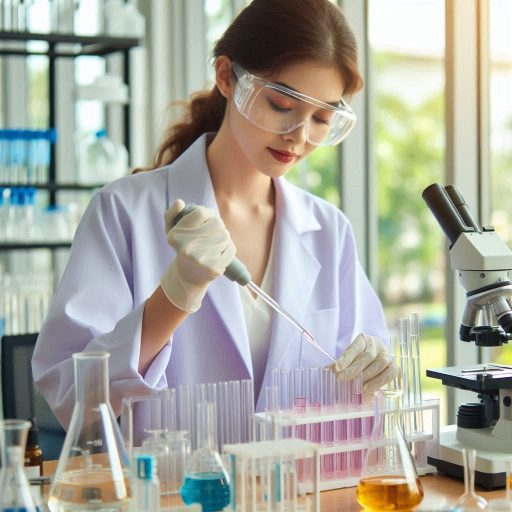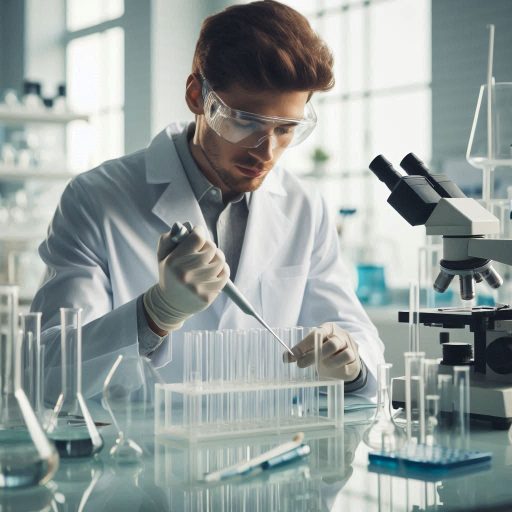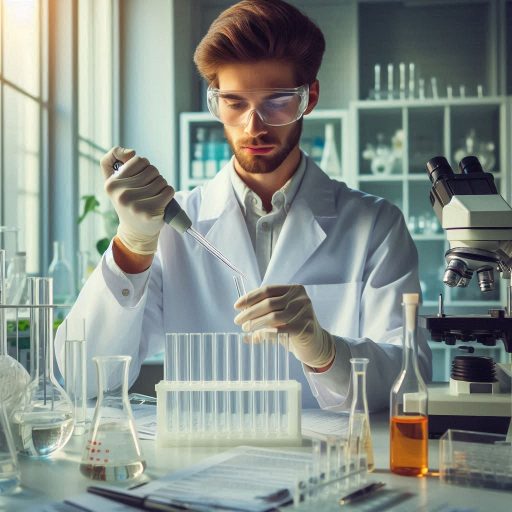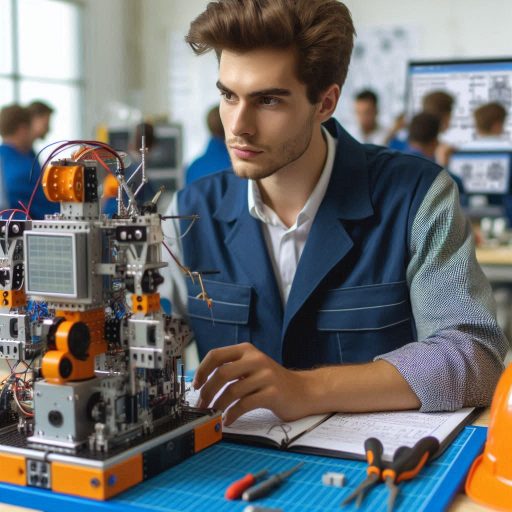Introduction
Lab technician jobs are vital in healthcare, research, and industrial settings.
These professionals perform crucial tasks that ensure the accurate processing and analysis of samples.
Their work directly impacts patient care, scientific discoveries, and product development.
This blog post will explore the differences between various types of lab technician jobs, highlighting the unique responsibilities and skills required in each role.
Lab Technicians in Healthcare
Healthcare lab technicians play a critical role in diagnosing and treating diseases.
They work in hospitals, clinics, and laboratories, analyzing blood, urine, and tissue samples.
Their primary responsibility is to conduct tests that help doctors make accurate diagnoses.
For example, clinical lab technicians focus on routine tests, while medical lab technicians handle more complex procedures like blood typing and cross-matching for transfusions.
This differentiation highlights the specialized skills and knowledge required in healthcare lab environments.
Lab Technicians in Research
Research lab technicians support scientific studies by conducting experiments and analyzing data.
They work in academic institutions, pharmaceutical companies, and government agencies.
Unlike healthcare lab technicians, their focus is on experimentation and innovation rather than routine testing.
Research lab technicians may be involved in developing new drugs, studying genetic materials, or testing environmental samples.
Their role requires a deep understanding of scientific methods and the ability to work with advanced laboratory equipment.
The distinction between research and healthcare lab technicians lies in their objectives‘researchers aim to expand knowledge, while healthcare technicians focus on patient care.
Lab Technicians in Industry
Industry lab technicians are essential in manufacturing, quality control, and product development.
They work in sectors like food production, cosmetics, and chemicals, ensuring products meet safety and quality standards.
These technicians conduct tests on raw materials, monitor production processes, and analyze finished products.
Unlike healthcare and research lab technicians, their work is directly tied to product safety and consumer protection.
For instance, a lab technician in a food processing plant might test for contaminants or ensure that products comply with regulatory standards.
The primary difference here is the emphasis on safety and compliance, making industry lab technicians vital to the production process.
Lab technician jobs vary significantly depending on the industry.
Healthcare, research, and industry lab technicians each have specialized roles that require unique skills and knowledge.
While all lab technicians share a common foundation in scientific analysis, their specific duties and responsibilities differ according to the demands of their respective fields.
Understanding these differences is crucial for anyone considering a career as a lab technician, as it helps align their skills and interests with the right industry.
By recognizing the distinct roles within this profession, aspiring lab technicians can make informed decisions about their career paths.
Educational Requirements for Different Lab Technician Jobs
The Varying Educational Requirements For Roles
Lab technician jobs encompass a wide range of specializations, each with its own unique educational requirements.
Here, we explore the varying educational requirements for roles such as medical lab technicians, research lab technicians, and forensic lab technicians.
Highlighting the importance of specialized training and certifications in certain fields.
Medical Lab Technicians
- Typically require an associate’s degree in medical laboratory technology or a related field.
- Candidates must also pass a certification exam to become a certified medical lab technician (MLT).
- Hands-on experience in a clinical laboratory setting is often preferred by employers.
- Specialized training in areas such as hematology, microbiology, and immunology may be necessary.
- Continuing education and regular re-certification are essential to stay updated in the field.
Research Lab Technicians
- Generally require a bachelor’s degree in biology, chemistry, or a related scientific field.
- Master’s degrees or Ph.D’s are often necessary for more advanced positions in research labs.
- Training in specialized techniques such as PCR, gel electrophoresis, and cell culture may be required.
- Experience with research methodologies, data analysis, and scientific writing is crucial.
- Certifications in laboratory safety and research compliance may also be required.
Forensic Lab Technicians
- Typically require a bachelor’s degree in forensic science, biology, chemistry, or a related field.
- Additional training in forensic techniques, evidence collection, and preservation is essential.
- Experience working in a forensic laboratory setting is highly valued by employers.
- Specialized certifications in forensic analysis, DNA analysis, or toxicology may be necessary.
- Continuing education in the latest forensic technology and techniques is crucial for career advancement.
Ultimately, the educational requirements for different lab technician jobs can vary significantly based on the nature of the work and the industry.
While some roles may only require an associate’s degree and certification, others may necessitate advanced degrees and specialized training.
It is crucial for aspiring lab technicians to carefully research the educational requirements for their desired field and pursue the necessary qualifications to succeed in their careers.
Read: How to Become a CAD Technician: Step-by-Step Guide
Job Duties and Responsibilities
One of the key factors that distinguish lab technician jobs is the specific duties and responsibilities associated with each role.
Let’s take a closer look at the typical tasks performed by medical lab technicians, environmental lab technicians, and microbiology lab technicians.
Medical Lab Technicians
- Collect and analyze bodily fluids, tissues, and cells for diagnostic purposes.
- Perform tests to help doctors diagnose and treat diseases like cancer, diabetes, and infections.
- Operate complex laboratory equipment and ensure accurate and reliable test results.
- Maintain detailed records of test results and communicate findings to healthcare professionals.
- Adhere to strict protocols and safety standards to prevent contamination and ensure patient safety.
Environmental Lab Technicians
- Conduct tests on water, air, and soil samples to identify pollutants and contaminants.
- Analyze samples to assess environmental quality and compliance with regulatory standards.
- Monitor and maintain equipment to ensure accurate and reliable data collection.
- Interpret test results and prepare reports for regulatory agencies and environmental organizations.
- Collaborate with scientists and engineers to develop strategies for pollution control and environmental protection.
Microbiology Lab Technicians
- Cultivate and identify microorganisms like bacteria, viruses, and fungi in lab settings.
- Perform tests to diagnose infectious diseases and study their impact on public health.
- Prepare samples for analysis, including staining, incubating, and examining under microscopes.
- Follow strict protocols to prevent contamination and ensure accurate identification of microorganisms.
- Collaborate with researchers and healthcare professionals to develop treatments and vaccines for microbial infections.
By comparing the tasks performed by medical lab technicians, environmental lab technicians, and microbiology lab technicians, we can see the diverse range of responsibilities within the field of laboratory science.
Each role plays a crucial part in advancing our understanding of health, environment, and infectious diseases,
highlighting the importance of specialized knowledge and expertise in various lab settings.
Read: Surveying and Mapping Technician Internships: A Guide
Work Environments
The Different Work Environments Lab Technicians May Find Themselves In
Lab technicians play a crucial role in various settings, each with its unique challenges and responsibilities.
Let’s explore the different work environments lab technicians may find themselves in:
Hospitals
- Hospital labs are fast-paced environments where lab techs perform tests on patient samples.
- Lab techs must prioritize urgent cases and deliver results promptly to assist in patient care.
- Working in a hospital setting means collaborating closely with medical professionals for accurate diagnosis.
- Lab techs in hospitals deal with a wide range of tests, from routine blood work to complex genetic screenings.
- Adhering to strict quality control standards is crucial to ensure accurate and reliable test results.
Research Laboratories
- Research labs focus on conducting experiments and studies to advance scientific knowledge and discovery.
- Lab techs in research settings often work on cutting-edge research projects in various scientific fields.
- They may be involved in developing new testing methods, analyzing data, and recording results for research papers.
- Collaborating with scientists and researchers is essential to drive innovation and progress in research labs.
- Attention to detail and critical thinking skills are vital for success in a research laboratory environment.
Crime Labs
- Crime labs assist law enforcement agencies by analyzing evidence collected from crime scenes.
- Lab techs in crime labs must follow strict chain of custody protocols to preserve the integrity of evidence.
- They analyze DNA samples, fingerprints, and other forensic evidence to help solve criminal cases.
- Working in a crime lab requires adherence to legal guidelines and ethical standards in handling sensitive information.
- Lab techs in crime labs play a crucial role in ensuring justice is served through scientific analysis of evidence.
Regardless of the work environment, lab technicians face unique challenges and responsibilities that can impact their daily work.
How Work Settings Can Impact The Daily Responsibilities And
Challenges Faced By Lab Technicians
Let’s discuss how work settings can influence the daily responsibilities and challenges faced by lab technicians:
- Workload: The workload can vary significantly based on the setting, with hospital labs often experiencing high volumes of samples requiring quick turnaround times.
- Specialization: Lab techs in research labs may have the opportunity to specialize in a particular area of science, whereas those in hospitals may need to perform a wide range of tests.
- Collaboration: Collaboration with other healthcare professionals, scientists, or law enforcement personnel is essential in different work environments.
- Technology: The type of equipment and technology available can differ, impacting the efficiency and accuracy of test results.
- Regulations: Lab techs must adhere to specific regulations and quality control standards relevant to their work environment.
Overall, the work environment plays a significant role in shaping the daily responsibilities and challenges faced by lab technicians.
Whether in a hospital, research laboratory, or crime lab, lab techs must adapt to their surroundings and leverage their skills to deliver accurate and timely results.
Read: Impact of Drones on Surveying and Mapping
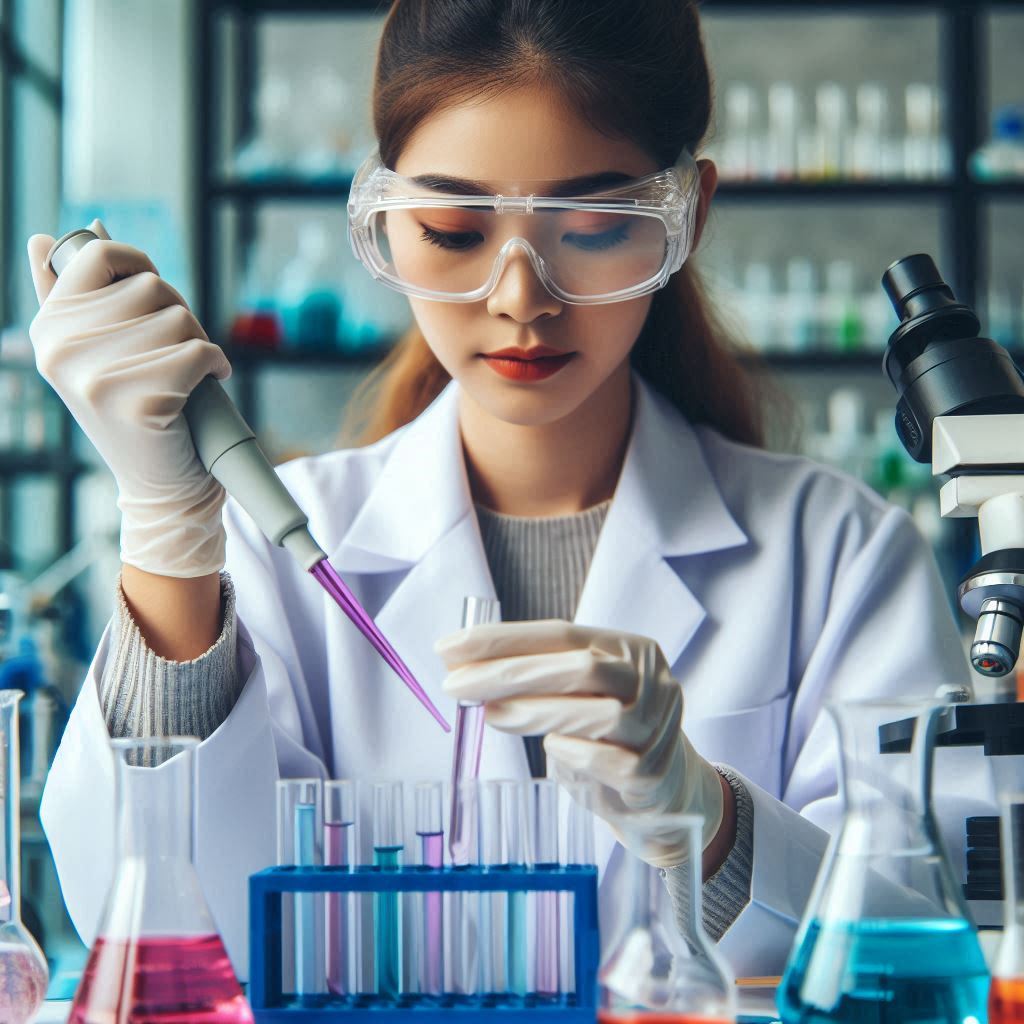
Salary and Benefits
Compare the Average Salaries and Benefits Offered to Lab Technicians in Various Fields
Lab technicians work across various fields, including medical, industrial, and environmental sectors.
Each sector offers different salary ranges and benefits.
In the medical field, lab technicians often earn higher salaries compared to other fields.
For instance, a medical lab technician’s annual salary typically ranges between $50,000 and $70,000.
This is due to the critical nature of their work, which involves analyzing clinical samples and supporting patient diagnoses.
Medical lab technicians may also receive benefits such as health insurance, retirement plans, and paid time off.
In contrast, industrial lab technicians, who work in manufacturing or quality control, usually have a slightly lower salary range.
Their annual earnings are typically between $40,000 and $60,000.
These roles are essential for maintaining product standards and ensuring safety regulations are met.
Industrial lab technicians may benefit from additional perks such as bonuses, education reimbursement, and job stability.
Environmental lab technicians, who analyze samples to monitor pollution levels and ensure environmental safety, often fall between these two salary ranges.
Their annual salaries generally range from $45,000 to $65,000.
Benefits for environmental lab technicians can include health benefits, professional development opportunities, and sometimes, flexible work schedules.
Highlight the Potential for Salary Growth and Advancement Opportunities Based on Specialization and Experience
Salary growth for lab technicians is influenced by specialization and experience.
Technicians who advance in their careers can expect significant salary increases.
Specialization in high-demand areas such as molecular diagnostics or forensic analysis often leads to higher earning potential.
Experienced lab technicians who gain expertise in these specialized fields can see salaries rise substantially.
Furthermore, obtaining advanced certifications or degrees can enhance career prospects.
Technicians with additional qualifications, such as a bachelor‘s or master‘s degree, may qualify for supervisory or managerial roles, which offer higher salaries.
For example, a lab manager in a medical setting may earn $80,000 to $100,000 annually, reflecting their higher level of responsibility and expertise.
Experience also plays a crucial role in salary growth.
Entry-level lab technicians start with lower salaries but can increase their earnings through years of dedicated work.
Experienced technicians often receive promotions and opportunities to lead projects or teams, which can result in salary boosts and additional benefits.
Overall, lab technicians have diverse opportunities for salary advancement.
By specializing in high-demand areas, obtaining advanced qualifications, and gaining experience, they can significantly increase their earning potential and enjoy various benefits throughout their careers.
Read: Top Surveying and Mapping Technician Employers
Job Outlook and Demand
The Job Outlook For Lab Technicians In Different Industries
Lab technicians play a crucial role in various industries, including healthcare, biotechnology, and government agencies.
The job outlook for lab technicians is generally positive, with demand expected to remain steady or increase in the coming years.
Healthcare Industry
- In the healthcare industry, lab technicians are essential for conducting diagnostic tests and analyzing patient samples.
- With the growing emphasis on preventive care and early detection of diseases, the demand for lab technicians in healthcare is expected to rise.
- Advancements in medical technology have also expanded the scope of lab testing, further driving the need for skilled lab technicians.
- Additionally, an aging population and increasing prevalence of chronic illnesses will contribute to the demand for lab technicians in healthcare settings.
Biotechnology Sector
- Lab technicians in the biotechnology sector are involved in research, development, and quality control processes.
- The biotechnology industry is continuously innovating and creating new products, leading to a steady demand for skilled lab technicians.
- As biotechnology companies focus on gene therapy, personalized medicine, and bioinformatics, lab technicians with specialized skills will be in high demand.
- The role of lab technicians in biotechnology is critical for ensuring the accuracy and reliability of scientific experiments and data analysis.
Government Agencies
- Government agencies rely on lab technicians to assist in regulatory compliance, public health initiatives, and forensic investigations.
- Lab technicians working for government agencies may be involved in monitoring environmental pollutants, food safety testing, and disease surveillance.
- Public health crises like pandemics or natural disasters can increase the demand for lab technicians in government agencies to respond effectively.
- Government-funded research projects and initiatives also create opportunities for lab technicians to contribute to scientific advancements and public policy decisions.
Factors Influencing Demand
- Advancements in technology, such as automation and robotics, are impacting the job responsibilities of lab technicians.
- Lab technicians need to adapt to new technologies and acquire additional skills to remain competitive in the job market.
- Population health trends, such as an increase in chronic diseases or infectious outbreaks, can influence the demand for lab technicians.
- Changes in healthcare policies, funding for research, and regulatory requirements can also affect the job outlook for lab technicians.
Overall, the job outlook for lab technicians is promising across various industries, with opportunities for growth and specialization.
Keeping up with industry trends and acquiring relevant skills will be essential for lab technicians to thrive in a dynamic and competitive job market.
Transform Your Career Today
Unlock a personalized career strategy that drives real results. Get tailored advice and a roadmap designed just for you.
Start NowContinuing Education and Professional Development
As a lab technician, continuing education and professional development are crucial for staying current in the field.
- Enhances Skills: Continuing education helps to enhance skills and knowledge, which is essential for providing accurate and reliable test results.
- Stay Updated: With advancements in technology and methodologies, staying updated through education ensures you are using the most effective techniques.
- Compliance: Many certifications and licenses require lab technicians to complete a certain number of continuing education credits to maintain compliance.
The importance of continuing education and professional development for lab technicians
Continuing education allows lab technicians to stay current with industry trends and best practices.
- Networking: Through continuing education programs, lab technicians can network with other professionals in the field, expanding their knowledge and connections.
- Specialization Opportunities: Further education can open up opportunities for specialization in a particular area of laboratory science, such as microbiology or genetics.
- Career Advancement: Continuing education can also lead to career advancement opportunities, including supervisory roles or higher-paying positions.
Opportunities For Specialization And Advancement Through Further Education And Certifications
Specialization in a specific area of laboratory science can lead to increased job opportunities and higher earning potential.
- Certifications: Obtaining certifications in areas such as clinical chemistry or histotechnology can demonstrate expertise and enhance credibility in the field.
- Advanced Degrees: Pursuing advanced degrees, such as a Master’s or Ph.D., can open up doors to research positions or teaching opportunities.
- Professional Organizations: Joining professional organizations related to laboratory science can provide access to specialized training and resources for career advancement.
Explore Further: Top Industries Hiring Field Service Technicians
Skills and Qualities
Key Skills And Qualities Needed To Succeed As A Lab Technician
- Attention to detail is essential for accuracy in conducting experiments and recording data.
- Strong analytical skills are necessary to interpret test results and troubleshoot issues.
- Good communication skills are important for collaborating with colleagues and reporting findings.
- Organizational skills help in managing multiple tasks and keeping track of various experiments.
- Time management is crucial to meet deadlines and prioritize urgent tasks in a fast-paced environment.
- Technical proficiency in using lab equipment and software is required for conducting experiments.
- Critical thinking skills are needed to evaluate protocols and improve laboratory procedures.
How Different Types Of Lab Technician Jobs May Require Specific Technical Skills Or Soft Skills
- Medical Lab Technician: Knowledge of medical terminology, equipment, and procedures for diagnostic testing.
- Forensic Lab Technician: Understanding of forensic techniques, evidence collection, and preservation methods.
- Research Lab Technician: Experience with research methods, data analysis, and scientific literature review.
- Quality Control Lab Technician: Proficiency in quality assurance practices, testing protocols, and compliance standards.
Soft Skills
- Collaboration: Working effectively in a team setting and sharing information with colleagues.
- Adaptability: Being flexible to handle unexpected challenges and adjusting to new procedures.
- Problem-Solving: Finding solutions to technical issues and improving lab processes.
- Critical Thinking: Analyzing data, identifying patterns, and making informed decisions.
- Attention to Detail: Noticing minor discrepancies or errors that could impact test results.
Having a combination of technical skills and soft skills is crucial for success in any lab technician role.
Depending on the specific field of work, such as medical, forensic, research, or quality control, different emphasis may be placed on certain skills.
For example, a medical lab technician would require a strong understanding of medical terminology and diagnostic testing procedures, while a research lab technician would need experience in data analysis and scientific literature review.
Ultimately, being adaptable and continuously improving both technical and soft skills will enable lab technicians to excel in their roles and contribute to the advancement of scientific knowledge.
Delve into the Subject: Industrial Machinery Mechanic Salary Insights
Conclusion
The main differences between lab technician jobs lie in their specialization areas.
Each job offers a unique set of skills, responsibilities, and opportunities for career advancement.
It is important for aspiring lab technicians to consider their interests and career goals.
By carefully evaluating the distinct aspects of each role, individuals can choose the path that aligns with their ambitions.
Whether one prefers working in a clinical, research, or industrial setting, there is a place for everyone in the field of laboratory technology.
Ultimately, the diversity within lab technician jobs provides a wide range of options for individuals to pursue fulfilling and rewarding careers.
It is crucial to explore these differences and make an informed decision that will lead to a successful and satisfying career in the laboratory technology field.
By understanding the unique attributes of each job, individuals can set themselves on a path towards professional growth and achievement.
So, whether you are passionate about patient care, scientific discovery, or manufacturing processes, there is a lab technician job waiting for you.
Take the time to reflect on your interests and aspirations, and choose the career path that best suits your goals in the field of laboratory technology.
[E-Books for Sale]
The Big Book of 500 High-Paying Jobs in America: Unlock Your Earning Potential
$19.99 • 500 High-Paying Jobs • 330 pages
Explore 500 high-paying jobs in America and learn how to boost your career, earn more, and achieve success!
See All 500 High-Paying Jobs of this E-Book
1001 Professions Without a Degree: High-Paying American Jobs You Can Start Now
$19.99 • 1001 Professions Without a Degree • 174 pages
Discover 1001 high-paying jobs without a degree! Unlock career tips, skills, and success strategies for just $19.99!

